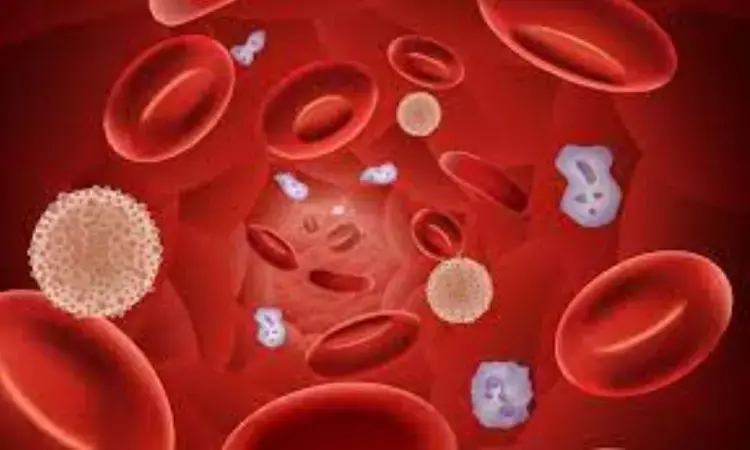- Home
- Medical news & Guidelines
- Anesthesiology
- Cardiology and CTVS
- Critical Care
- Dentistry
- Dermatology
- Diabetes and Endocrinology
- ENT
- Gastroenterology
- Medicine
- Nephrology
- Neurology
- Obstretics-Gynaecology
- Oncology
- Ophthalmology
- Orthopaedics
- Pediatrics-Neonatology
- Psychiatry
- Pulmonology
- Radiology
- Surgery
- Urology
- Laboratory Medicine
- Diet
- Nursing
- Paramedical
- Physiotherapy
- Health news
- Fact Check
- Bone Health Fact Check
- Brain Health Fact Check
- Cancer Related Fact Check
- Child Care Fact Check
- Dental and oral health fact check
- Diabetes and metabolic health fact check
- Diet and Nutrition Fact Check
- Eye and ENT Care Fact Check
- Fitness fact check
- Gut health fact check
- Heart health fact check
- Kidney health fact check
- Medical education fact check
- Men's health fact check
- Respiratory fact check
- Skin and hair care fact check
- Vaccine and Immunization fact check
- Women's health fact check
- AYUSH
- State News
- Andaman and Nicobar Islands
- Andhra Pradesh
- Arunachal Pradesh
- Assam
- Bihar
- Chandigarh
- Chattisgarh
- Dadra and Nagar Haveli
- Daman and Diu
- Delhi
- Goa
- Gujarat
- Haryana
- Himachal Pradesh
- Jammu & Kashmir
- Jharkhand
- Karnataka
- Kerala
- Ladakh
- Lakshadweep
- Madhya Pradesh
- Maharashtra
- Manipur
- Meghalaya
- Mizoram
- Nagaland
- Odisha
- Puducherry
- Punjab
- Rajasthan
- Sikkim
- Tamil Nadu
- Telangana
- Tripura
- Uttar Pradesh
- Uttrakhand
- West Bengal
- Medical Education
- Industry
No antithrombotic therapy okay for select TAVR patients: Data from OCEAN-TAVI Registry

Japan: In selected patients with transcatheter aortic valve replacement (TAVR), the nonantithrombotic strategy may be an acceptable alternative to single-antiplatelet therapy (SAPT)/dual-antiplatelet therapy (DAPT), a recent study has concluded. The study results appeared in the JACC: Cardiovascular Interventions on December 14, 2022.
According to provocative registry data from Japan, the nonantithrombotic strategy compared to SAPT/DAPT was not associated with an increased risk of net adverse clinical events (NACEs) (i.e., stroke, cardiovascular death, myocardial infarction, and life-threatening or major bleeding) and potentially lowered the risk of bleeding events.
Several trials have shown that aspirin monotherapy versus aspirin plus clopidogrel is linked with a lower incidence of bleeding without an increased risk of ischemic events in patients after TAVR; however, more data must be collected to prove the prerequisite of even aspirin monotherapy. To fill this knowledge gap, Yusuke Kobari from Keio University School of Medicine in Tokyo, Japan and colleagues aimed to compare clinical outcomes and valve performance of the three different antithrombotic strategies following TAVR from the OCEAN-TAVI (Optimized transCathEter vAlvular iNtervention) registry.
The study's primary outcome was the incidence of NACEs, including stroke, cardiovascular death, myocardial infarction, and major or life-threatening bleeding. The authors excluded patients who received anticoagulation or had procedural complications. The rest of the patients were divided into three groups based on the antithrombotic regimen at discharge: 1) no antithrombotic therapy, 2) single-antiplatelet therapy, and 3) dual-antiplatelet therapy.
The authors reported the following findings:
3,575 TAVR patients were included (None, 293; SAPT, 1,354; DAPT, 1,928).
After a median follow-up period was 841 days, the incidence of NACEs did not differ between the groups (None vs SAPT: adjusted HR [aHR]: 1.18; None vs DAPT: aHR: 1.09).
There was a lower incidence of all bleeding in patients with no antithrombotics (None vs SAPT: aHR: 0.63; None vs DAPT: aHR: 0.51).
The valve performance was similar among the groups. Leaflet thrombosis was detected in 8.5% of the nonantithrombotic group.
"The nonantithrombotic strategy compared with SAPT/DAPT was not associated with an increased NACEs risk and potentially reduced the risk of bleeding events," the authors wrote. "The nonantithrombotic strategy may be an acceptable substitute to SAPT/DAPT in selected TAVR patients."
In contrast to the current guidelines recommending SAPT post-TAVR, the findings indicate that even lifelong low-dose aspirin and short-term DAPT may not be required after TAVR. The current preference for SAPT after TAVR is based on trials such as POPular TAVI, in which SAPT was linked with a lower incidence of bleeding without an increased ischemic events risk compared with DAPT.
Reference:
The study titled "No Antithrombotic Therapy After Transcatheter Aortic Valve Replacement: Insight From the OCEAN-TAVI Registry" was published in JACC: Cardiovascular Interventions. DOI: 10.1016/j.jcin.2022.10.010
Dr Kamal Kant Kohli-MBBS, DTCD- a chest specialist with more than 30 years of practice and a flair for writing clinical articles, Dr Kamal Kant Kohli joined Medical Dialogues as a Chief Editor of Medical News. Besides writing articles, as an editor, he proofreads and verifies all the medical content published on Medical Dialogues including those coming from journals, studies,medical conferences,guidelines etc. Email: drkohli@medicaldialogues.in. Contact no. 011-43720751


